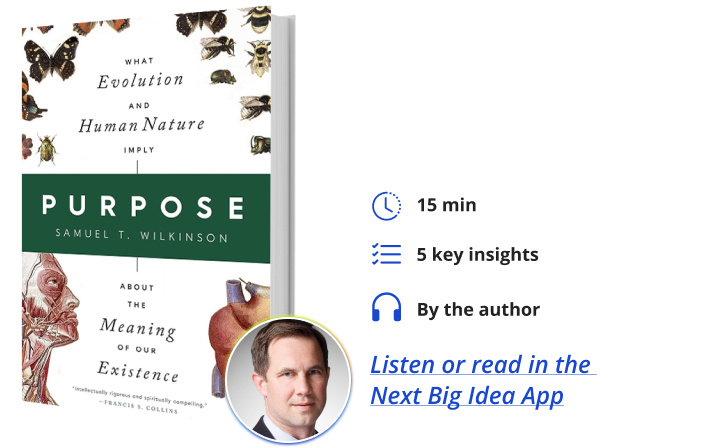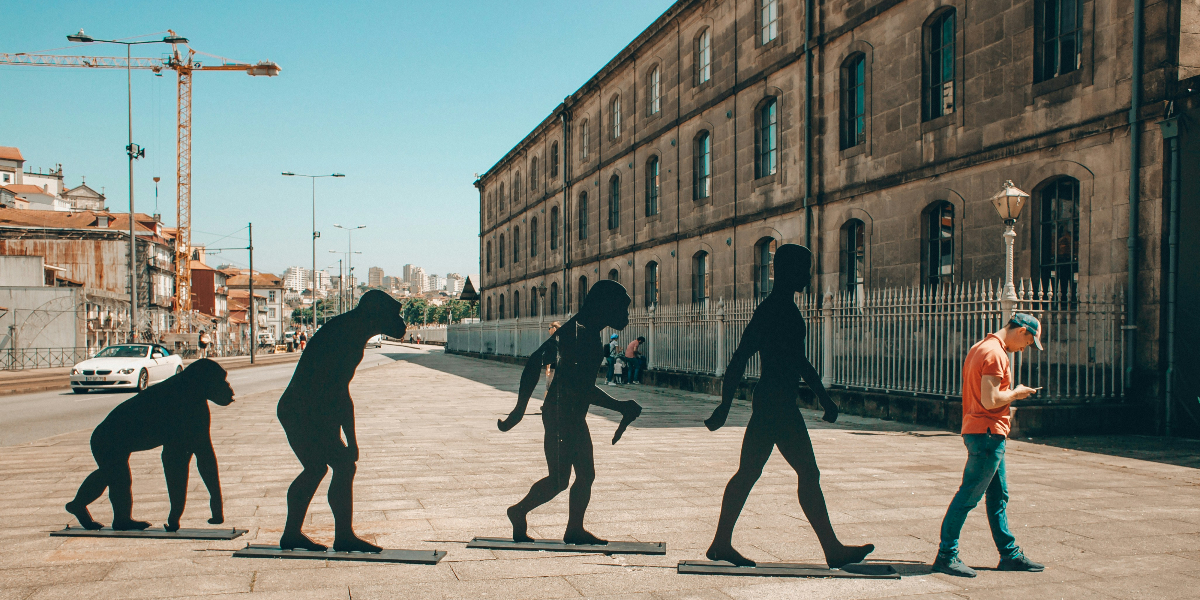Samuel Wilkinson is Associate Professor of Psychiatry at the Yale School of Medicine, where he also serves as Associate Director of the Yale Depression Research Program. He has published articles in the New York Times, Washington Post, and Wall Street Journal.
Below, Samuel shares five key insights from his new book, Purpose: What Evolution and Human Nature Imply about the Meaning of Our Existence. Listen to the audio version—read by Samuel himself—in the Next Big Idea App.

1. Our existence is not an accident.
One of the reasons that the theory of evolution has been so controversial for the last century and a half is that many people assume that it implies life is just an accident. We are nothing more than tens of thousands of intricate molecular mutations, or so the thinking went. Many people have taken this one step further, concluding that there is no inherent meaning in life. We are doomed to live, breathe, die, and whittle away our lives in a cold, indifferent universe without any purpose to our existence.
But this thinking is wrong. Evolution wasn’t a random process. There are now countless examples pointing to higher-order principles that have guided evolution. The best evidence for this is the way in which creatures have developed the same structures independently. For instance, birds, bats, and butterflies all have wings and the capacity for flight, but each of these creatures developed wings on separate evolutionary tracks.
Another example: a form of photosynthesis (a remarkably complex biochemical process) has developed independently about 60 different times. And eyes—these remarkable structures by which we perceive the world—have evolved independently about 40 different times. Virtually every biological trait or structure has evolved into being more than once.
Simon Conway Morris, the eminent biologist largely responsible for discovering these patterns, sums it up like this: “I can’t think of anything which has evolved only once—or very, very few exceptions.” Other scientists frame it this way: “While chance plays a preeminent role in setting the course of evolution, it contributes much less to the determination of its outcome.”
2. Unfortunately, we are selfish.
In the opening pages of his famous book The Selfish Gene, Richard Dawkins declared, “If you wish … to build a society in which individuals cooperate generously and unselfishly towards a common good, you can expect little help from biological nature … because we are born selfish.”
“There are now countless examples pointing to higher-order principles that have guided evolution.”
This is another reason why the theory of evolution has been controversial. What it implies about human nature is not very encouraging. Most people would agree that it doesn’t take long to scan through the history book of humanity to see that, unfortunately, we have a capacity to behave in terribly selfish and violent ways.
This is a bitter pill to swallow and a very depressing view of human nature. Yet, over time, we’ve realized that the picture of human nature is complex.
3. In a paradoxical way, we also have a deep capacity for altruism.
From a strictly scientific perspective, how do humans have the capacity for altruism if evolution favors the selfish? Well, it’s complicated. This paradox is best illustrated by the remarkable story of two shipwrecks at the same time and place.
In 1864, two ships crashed on the opposite sides of the Auckland Islands, an archipelago 300 miles south of mainland New Zealand. The first vessel was captained by Thomas Musgrave. Following a harrowing ordeal of 18 months, and thanks to much ingenuity and resourcefulness, all of the men from Musgrave’s ship survived. The second ship was led by Captain George Dalgarno. Unfortunately, most of the men aboard Dalgarno’s vessel died.
The difference was that the survivors of Captain Musgrave’s ship formed a remarkably cohesive group. This was best exemplified in the first minutes of the shipwreck when Musgrave carried an injured man on his back as he swam through torrential waves to the safety of the shore.
“Selfishness beats altruism within groups, but altruistic groups beat selfish groups.”
The group from Captain Dalgarno’s ship, on the other hand, was characterized by an every-man-for-himself approach. Within the first few days following their shipwreck, they left a wounded man behind to die.
It may be true that at some periods in our evolutionary past, the trait of selfishness helped our ancestors survive. But it’s not hard to imagine scenarios in our distant past similar to the shipwrecks at the Auckland Islands, where altruism, not selfishness, led to survival. As two renowned biologists have noted: “Selfishness beats altruism within groups, but altruistic groups beat selfish groups. Everything else is commentary.”
This principle applies not only to the traits of selfishness and altruism but also to a host of other opposing traits: aggression and cooperation, cruelty and kindness, lust and love. In a cruel twist of fate, nature has fashioned within us opposition in so many ways. In a very real way, we are pulled in different directions. This is what I call the dual potential of human nature.
4. Life is a test.
When we combine the dual potential of human nature with the observation that we have free will, all this provides a framework suggesting that there is a universal purpose to our existence. This purpose, at least one of them, is to choose between the good and evil impulses that nature has created within us. Life, it would seem, is a test. And it can’t be a real test unless we are pulled in one direction or the other.
This framework of human nature also helps us escape the quagmire that philosophers, economists, and scientists have been stuck in for centuries. Are we selfish or altruistic? Are humans aggressive or prone to cooperate? Are we monogamous or promiscuous? The stunning answer seems to be that yes, we have the potential to be all of these things.
History has too many examples of the darker propensities of human nature. One hardly has to try coming up with cases of this unfortunate truth. Yet history is full of moral heroes, too. Those who have chosen to follow the quiet but stirring and unselfish appeals to human nature.
“To act unselfishly, to forgive, to treat others with compassion—these capacities are nested to some degree in all of us.”
For example, in the fall of 2004, forty-four-year-old Victoria Ruvolo of Long Island, New York, was driving home from seeing a niece sing at a recital when the eighteen-year-old passenger of an approaching car, Ryan Cushing, hurled a twenty-pound frozen turkey toward her oncoming vehicle. Cushing intended the act as a prank, but the frozen turkey shattered Victoria’s windshield and fractured many of the bones in her face. After extensive reconstructive surgery, Victoria spent nine months in the hospital and rehabilitation centers before returning to work. Prosecutors were seeking the maximum sentence of twenty-five years in prison for Ryan. But Victoria had other plans. “I didn’t want Ryan to rot in jail,” she recounted. She lobbied for a more lenient sentence, hoping he could still make something of his life. After pleading guilty, Ryan spoke with his victim in the courtroom. The two embraced as he wept. “I’m so sorry. I didn’t mean it.” Her reply: “It’s okay. I just want you to make your life the best it can be.”
From a purely biological perspective, how do we explain such behavior? Victoria Ruvolo faced a choice of how to respond, and she could have chosen otherwise. To act unselfishly, to forgive, to treat others with compassion—these capacities are nested to some degree in all of us.
5. Cultivating strong personal relationships helps bring out the better angels of our nature.
Sometimes, in this hyper-politicized world, we are tempted to view the world as comprised of people who are fully good or fully evil. This is wrong and such thinking can lead to dangerous ideologies. The world is full of people, all of whom have both strengths and weaknesses. Each one of us is a complicated mix of good and bad.
My experience as a psychiatrist and as a pastor has convinced me that most people are trying to do what is right, but it’s a struggle. Sooner or later the pull of selfishness is strong. We ought to be patient with each other, and with ourselves.
“The point of life is to point out and overcome the weaknesses in ourselves.”
The point of life is not to point out the weaknesses of your spouse, your neighbor, or even your political opponent. The point of life is to point out and overcome the weaknesses in ourselves.
If we believe in the most up-to-date theories of human nature, it’s clear that the positive aspects of human behavior—love, trust, loyalty, kindness—all have their origin in the way that nature shaped our personal relationships. My argument is that when we invest heavily in our personal relationships to the point that they thrive, the more positive aspects of our nature are accentuated. It becomes easier to overcome the selfish tendencies with which all of us are burdened. This is exactly what we see in the social sciences. In essence, we become our best selves when we prioritize our personal relationships.
If the purpose of life is to strive to overcome the weaknesses within us, the meaning of life is to cultivate strong and enduring relationships. At least this is what people report as the most meaningful aspects of their lives. This seems to be a function of how we are evolutionarily wired. It’s how nature created us.
To listen to the audio version read by author Samuel Wilkinson, download the Next Big Idea App today:
































